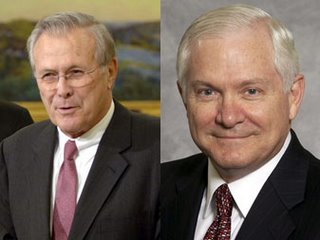
Who is Secretary of Defense nominee Robert Gates?
Is he the man who fixed intelligence around his agenda during Iran-Contra?
Or is he the problem-solver who currently serves on the Iraq Study Group panel?
David Corn examines the issue in his blog at The Nation.
First, the negatives:
...here's more of the same: another retread from the Bush I clan with a problematic past. Gates served as CIA director for the first President Bush in the early 1990s--and did so after contentious nomination hearings aired accusations that Gates had skewed intelligence analysis when he was a senior CIA manager. The allegations were quite serious. Several CIA analysts testified he had "politicized" intelligence reporting by making certain that estimates conformed to the conservative political viewpoints favored by the Reagan White House--most notably, that the Soviet Union was a more threatening adversary.Fixing intelligence to support a policy decision...gee, where have we heard that before?
He further writes,
Gates' nomination to be CIA head was imperiled by other controversies. He had directly engaged in secret intelligence sharing with Iraq in 1986 that critics claimed was illegal. Gates, who apparently possesses a photographic memory, testified that he could not recall key aspects of the Iran-contra affair. Senator Bill Bradley, a Democrat, accused Gates, a career Soviet analyst, of having ignored the changes under way in that country in the late 1980s. "Mr. Gates got it dead wrong," Bradley complained in 1991. Bradley also charged that when Gates was the deputy CIA chief he had neglected the important task of collecting intelligence on Iraq. Despite all this, the Democratic-controlled Senate approved the Gates nomination, and he served as CIA director for fourteen months. (In 1987, President Ronald Reagan nominated Gates to be CIA chief, and then the White House pulled his nomination in the midst of the Iran-contra scandal.)But, just when you think defending the Secretary of Defense nominee is indefensible, Corn makes a couple of points in Gates' favor. After noting that Gates is not Donald Rumsfeld, Corn writes,
Gates is a conservative but a realist; he's no neocon. For instance, he's advocated trying to reach an accommodation with Iran. That impresses Gary Sick, who during the Jimmy Carter years worked on the National Security Council with Gates. Sick points to the fact that in 2004 Gates co-chaired a Council on Foreign Relations task force that urged "a revised strategic approach to Iran" incorporating selective engagement with Tehran. This was a polite slam against the Axis-of-Evil approach of the Bush-Cheney administration. Sick, a critic of the administration and the Iraq war, views the Gates' nomination as a possible indicator that the Bush administration is turning from "neocon ideology to political realism."Finally, Corn argues,
More important--and this is what's intriguing about the Gates nomination--Gates is a member of the Iraq Study Group, a panel chaired by former Secretary of State James Baker, a Republican, and former Representative Lee Hamilton, a Democrat. The bipartisan commission's mission is to assess the situation in Iraq and propose policy options. Baker has already said that he believes a strategic shift is needed in Iraq and that his commission will produce specific recommendations in this regard. (The commission is reportedly considering different versions of disengagement, among other ideas.) Baker picked Gates to be on the commission, presumably with knowledge of Gates' thinking on the subject. Thus, it's no stretch to see Gates as an envoy (or a sleeper agent?) of the commission assigned to (or planted within) the Bush administration. Given other possible choices for the Pentagon job (Joe Lieberman?), it's somewhat heartening that Bush has invited into his Cabinet a non-neocon who has been working with Baker to find a way out of Iraq.David Corn seems to be of the opinion that the good outweighs the bad here. Not that I expect it, but I would like to think the investigation of instances of possible intelligence-fixing would have to be sufficiently answered before I would approve of the decision to put the instruments of waging war into his hands.
But that's just me.


3 comments:
Oh, no, Scoot, that's not just you! Many of my friends at DrinkingLiberally tonight had the very same reservations about the timing, choice, past connections, misdemeanors of IranContra and eerie echo of "fixing the facts around the policy"...
Can we hope that our suddenly-legitimate Dem senators will give Mr. Gates a very thorough vetting? Like you--we can ONLY hope...
Naomi
Or is it a ploy in the vein of Harriet Miers?
Someone so bad that they get us to accept someone else potentialy worse just to get it over with.
Oh, my tinfoil hat!
No, bluebear2, I think not, not this time. Daddy Dearest chose Gates; Sonny Boy chose Harriet...
Has the administration of President Godsend turned into a "caretaker" regency, with GHWB in charge? Pushing out the very pushy Veep Vader?
I wonder how that'll turn out...
Naomi
Post a Comment